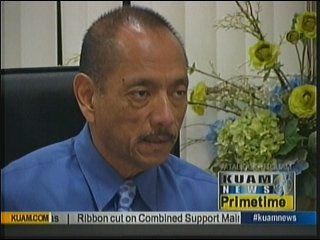Efforts continue to enforce deportation laws
Koisimy Rudoplh supports Vice Speaker B.J. Cruz's effort relative to enforcing deportation laws under the Compacts of Free Association

Guam - It was earlier this month when vice Speaker B.J. Cruz met with federal officials over the growing and largely uncompensated costs of hosting non-immigrant residents along with ways of enforcing deportation laws already in place. And support continues to grow on the issue just as efforts move forward by island leaders.
Koisimy Rudolph is originally from Pohnpei and has been a resident of Guam for over two decades. He teaches art and is the president of the non-profit Federated States of Micronesia Church Leader's Association of Guam. He also supports Cruz's effort relative to enforcing deportation laws under the Compacts of Free Association, saying, "I think everybody that has committed a crime that fits into the category of deportation - we should follow through with it and implement the law."
Under COFA, habitual residents are subject to removal if they have not been self-supporting for more than 60 days, have fraudulently received unauthorized public benefits or are already subject to removal under immigration laws. It's these very laws Cruz has said the feds were unaware they could even enforce, which came as a shock to Rudolph.
"I don't seem to agree very much in the fact that they were not aware of it," he said.
Cruz has stated that the uncompensated costs of hosting non-immigrant Freely Associated States residents evidently has become an increasing burden on Guam's public services and public safety. And while he doesn't have exact figures, Rudolph says he is aware of some non-immigrant FAS residents who are without a job, not going to school or even homeless - some of whom Rudolph says are content with.
He said, "I don't feel too good because they then become burdens to the government and other non-profit organizations who are providing services and they become also further burden to friends and familie."
It also doesn't help that Compact impact reimbursements have been an ongoing struggle between the federal government and Guam. "So I think the bottom line is the US has to measure up to its share of responsibly of what it says in the Compact," he said.
He says many organizations including his own have since stepped up recently to ease the adverse impact of crimes committed by the FAS communities from tutoring to parenting training for those with parents who are incarcerated.
Cruz in the meantime has since met with the Governor's Office drawing for support on the matter and even brought it to the attention of a recent congressional delegation on island to discuss the military buildup. Cruz says while the feds may not agree, COFA has everything to do with the entire foundation of the Pacific Pivot.
"You're going to be spending billions on all kinds of other things and you also have to think about spending hundreds of millions if not billions in reimbursing those of us who have undertaken the responsibility and burden of supporting this very integral part of the Pacific Pivot policy," Cruz explained.
Cruz hopes to send more information to US Immigration and Customs Enforcement that would include hopefully a letter from the governor, a letter from 2011 by a Hawaii congressional delegation raising concern on the compacts and data from the homeless coalition count.
And while the feds haven't been too responsive, Cruz says especially in light of recent events, he's not giving up, noting, I'm like a pit bull: once I bite on to your leg, I ain't letting go, I want to know and I'll keep writing and writing until I get some kind of action or answer or told to go off the Marianas Trench, whatever, I'm going to keep pushing on it."
Rudolph meanwhile hopes he can aid island leaders in working on positive solutions, saying, "We need to look at a way to network together with our economy, need to look at coming together as nations in this part of the Pacific."

 By KUAM News
By KUAM News